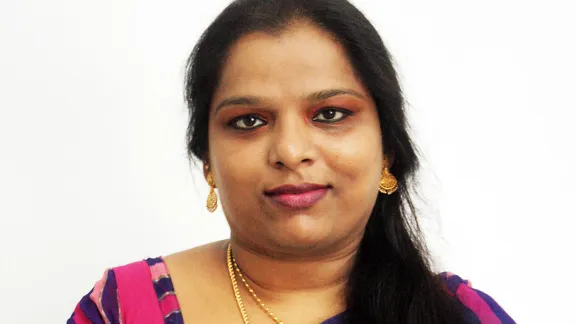
Beryl Logan, coordinator of HIV and AIDS work for Indiaâs Lutheran churches says fear of discrimination by families and society poses major challenges for AIDS patients in the country. Photo: UELCI
Perceptions are changing about the church and people living with HIV
(LWI) - India’s Lutheran churches are reaching out to people living with HIV in a context in which the epidemic is slowing down but poverty and stigma pose major challenges.
“The people are afraid to attend the voluntary blood testing camps, thinking that if their status is revealed they may face discrimination and lose their jobs, which will lead to further poverty. They also fear segregation from their families,” says Beryl Logan, coordinator of the HIV and AIDS desk at the United Evangelical Lutheran Churches in India (UELCI).
India’s HIV infection rate has declined since 2005, with the proportionately low prevalence of 0.3 percent in 2013 accounting for 2.1 million people living with the virus, according to the United Nations AIDS body, UNAIDS. In addition, the 130,000 AIDS associated deaths three years ago counted for more than half of such lives lost in the entire Asian region.
The main factors contributing to HIV infections in the country of 1.3 billion are extensive migration as people, mainly male, move to urban centers looking for employment, low literacy levels in certain rural areas and gender disparity.
The blood testing camps are part of the HIV and AIDS Awareness, Care and Capacity Building program of the 12 Lutheran churches that make up UELCI. The Lutheran World Federation (LWF) supports its member churches’ program, which includes four counselling centers in the Tamil, Telugu and Hindi-speaking regions and home visits to remote villages without access to public health centers. In addition, the outlets provide training for nurses and paramedical staff, distribute information to the villagers, host AIDS’ awareness rallies, educational puppet shows and video documentaries about the disease.
The program activities are changing perceptions about the church and the people affected by HIV, Logan says. “The communities in which we work increasingly see a church that is building and strengthening capacity of all people: pastors, women, lay leaders, youth, school and college students, as well as factory laborers, lorry drivers, and commercial sex workers through outreach and peer to peer education.”
In our work, we emphasize liberation of the excluded people and affirm that stigma based on health issues has no place in human relationships.
The UELCI began active engagement in AIDS work in 1989. In 2015 the body of 4.5 million Lutherans supported 12,865 people living with or affected by HIV.
LWF AIDS handbook
The church has translated the LWF HIV and AIDS handbook Grace, Care and Justice into the widely spoken Hindi, Tamil and Telugu languages “because this is a useful resource that deals with all the issues about the pandemic: prevention, transmission and care provision,” Logan explains. “We have distributed this publication to all the member churches and those trained by our program are using it during meetings with the local people.”
She says one of the greatest challenges is how to deconstruct the strong belief in Indian society that the AIDS pandemic is caused by people who engage in illicit sexual relationships or immoral living. “Several people in the churches even use the Bible to justify the exclusion of people living with HIV,” Logan says. “In our work, we emphasize liberation of the excluded people and affirm that stigma based on health issues has no place in human relationships,” she adds.
Access to treatment and care
Around six percent of people living with HIV in India receive free government treatment including antiretroviral or ARV medication. But changes in the public health delivery system are likely to put off many who require such services, according to Logan. Until recently, volunteers could collect medication on behalf of affected persons but new regulations require patients to collect the ARV drugs in person. “This move is very problematic. It will further marginalize those who could not afford to get to distant health centers or avoided going there altogether because they feared exposing their AIDS status and facing ridicule and discrimination in society,” she says.
The UELCI AIDS desk coordinator is in Durban, South Africa in mid-July, as one of the LWF delegates at the 21st International AIDS Conference. She hopes the gathering and its Interfaith Pre-Conference will be an opportunity to learn how others are dealing with the challenges faced by AIDS patients and those who support them.
Logan says the theme of the conference, “Access equity rights now,” is timely. “It demands the collective action of faith-based communities in overcoming the perceptions and practices that perpetuate marginalization of people living with HIV,” she adds.


